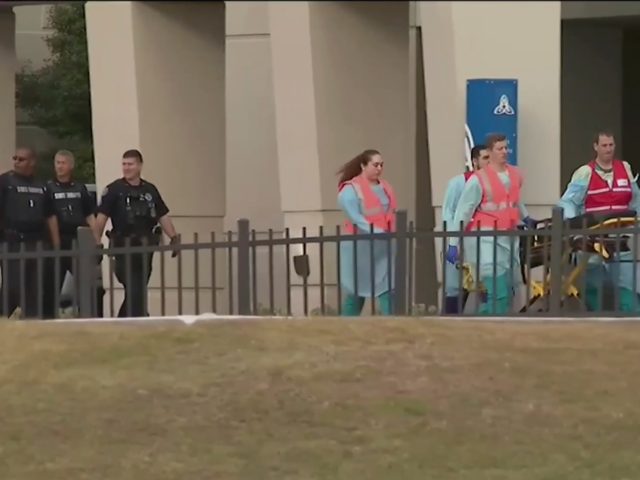Several U.S. officials, including President Donald Trump, have strongly hinted the government of Saudi Arabia should provide financial assistance to the victims of the Pensacola terrorist attack and their families.
Their argument is based on the fact the terrorist was a Saudi military pilot undergoing training at the Naval Air Station.
If the Saudis do not provide such assistance voluntarily, the families might potentially resort to filing a lawsuit under the Justice Against Sponsors of Terrorism Act (JASTA) of 2016.
JASTA was passed in September 2016 with a vote strong enough to override then-President Barack Obama’s veto – the only time during Obama’s presidency Congress defeated his veto power. Its Democrat sponsor in the Senate was Chuck Schumer (D-NY), who is currently the minority leader.
Obama said the law was passed in a burst of misguided sympathy for 9/11 families and warned it set a “dangerous precedent” that could lead to reciprocal actions against Americans stationed overseas and retaliatory lawsuits against American interests.
Other critics assailed JASTA as an encroachment upon presidential prerogatives in foreign affairs and worried it could dissuade foreign governments from cooperating with the United States in counter-terrorism investigations. One specific concern was that the discovery process in terrorism lawsuits could expose sensitive information, giving foreign governments an incentive not to put their secrets at risk by working with U.S. intelligence.
For better or worse, lawsuits under JASTA have indeed exposed information the Saudi government and/or U.S. officials preferred to keep secret. Also for better or worse, imprisoned 9/11 mastermind Khalid Sheikh Mohammed recently indicated he might be willing to provide depositions in the lawsuits.
JASTA is not explicitly limited to 9/11, but the families of those killed during the 9/11 attack were strong supporters of the legislation and were the first to pursue claims under the new law. Billions of dollars in claims are pending after surviving a 2018 effort by Saudi Arabia’s legal representatives to get them dismissed. Protesters in Washington, DC, who were assaulted in 2017 by security guards working for Turkish President Recep Tayyip Erdogan have also invoked JASTA in their lawsuits to overcome Erdogan’s immunity as a foreign head of state.
The central idea behind JASTA is that under the earlier Foreign Sovereign Immunities Act (FSIA), foreign governments could only be sued for damages related to terrorism if they had been formally designated as “state sponsors of terrorism” by the U.S. government. Such designations have been applied against very few foreign states, and the Kingdom of Saudi Arabia is not one of them.
JASTA partially removed this requirement and made it possible to sue nations that have not been designated as state sponsors of terrorism, especially if the terrorist acts in question were perpetrated by designated foreign terrorist organizations, such as al-Qaeda or the Islamic State. The Pensacola killer, Saudi Royal Air Force 2nd Lt. Mohammed Alshamrani, is under investigation by both U.S. and Saudi officials to determine if he had ties to such an organization. If firm ties to a recognized terrorist organization could be established, a potential lawsuit under JASTA would become easier to pursue. Alshamrani was killed by a police officer during his attack.
The U.S. government can intervene in lawsuits brought under JASTA and could request delays in court proceedings if it asserts the defending foreign governments are making “good faith” efforts to resolve claims. Based on current statements from U.S. officials, this would most likely occur if a suit was filed by the families of the Pensacola victims, since the Saudi government has been praised for its energetic cooperation in the investigation.
Various American officials and elected representatives have strongly hinted the Saudi government should step up to assist the families of the victims, without explicitly raising the possibility of legal action if they fail to do so.
Florida Gov. Ron DeSantis, a Republican and former Navy attorney, put it very bluntly on Friday: “The government of Saudi Arabia needs to make things better for these victims. I think they are going to owe a debt here, given that this is one of their individuals.”
President Trump said on Saturday that Saudi King Salman bin Abdulaziz will be “involved in taking care of families and loved ones” in Pensacola.
“He’s very, very devastated by what happened and what took place,” Trump said of the king.
The Saudi government could prove reluctant to take any action that would make it appear liable for the Pensacola attack or directly responsible for the killer, especially if the possibility of lawsuits under JASTA looms.
The U.S. government certainly would not welcome legal proceedings that further strain the U.S.-Saudi relationship after flight training for over 300 Saudi students was shut down on Tuesday. To date, there has been no indication a lawsuit could be filed by the families of the Pensacola victims. Presumably, those families are waiting to see what the Saudis do on their own, or with a bit of prodding from officials like Governor DeSantis.

COMMENTS
Please let us know if you're having issues with commenting.